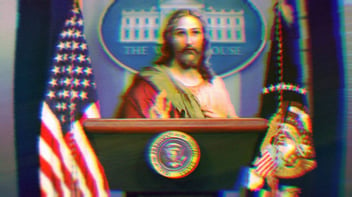The Prosperity Doctrine.
Christ as Capitalist.
 Image Description: A person with their arms outstretched towards the sun.
Image Description: A person with their arms outstretched towards the sun.
Most of us, I hope, recognize the absurdity of Christ as capitalist. But, for millions of Americans, there is no conflict between the teachings of Jesus Christ as told in the Bible and their belief that Jesus would want them to make a ton of dough, shit on the poor and deny safe harbor to asylum seekers.
From the beginning, Americans have been trying to stuff Jesus into politics, despite the Founding Fathers having created a system that specifically prevents it.
More on that in a bit. Zealots have been here since the first European ships arrived on our shores, and that has led many to mistakenly believe that the United States is a Christian nation. There’s a difference between a nation filled with Christians and a Christian nation.
We can acknowledge that the country was predominantly Christian since its founding, but Pew Research shows that, today, 65% of Americans identify as Christian, which is down from 90% in just the late ‘70s. Despite the decline, they sure do make a lot of noise. Personally, I have zero fucks to give about anyone’s religion. I have several fucks to offer, however, when it comes to applying a twisted orthodoxy to public policy, particularly when it’s so clearly a perversion of your sacred doctrine.
So while I do not intend to vomit all over your special book, I do want to unf*ck why and how it became acceptable for fundamentalist Christians to insert their throbbing dogma into America’s policy womb. Join me if you will on a less-than-spiritual journey through the history of American fundamentalism as we unf*ck the prosperity doctrine: Christ as capitalist.
Any discussion of evangelical influence over American politics has to begin with Doug Coe. Very few people outside of Christian fundamentalist and insider Bible Belt circles really knew who Doug Coe was, but he was one of the most influential people of the 20th Century and early 2000s. If you’re outside of these circles and have heard of Coe, you were probably introduced to him through the Netflix documentary, The Family. We’ll get to Coe and his followers shortly to help understand how he was able to quietly amass such enormous influence in policy circles.
What Coe and his followers represent is the quiet, dangerous underbelly of fundamentalism that attacks liberalism and progress under the cloak of a rather radical biblical interpretation. It’s a far cry from the public babbling evangelical lunacy that we’re exposed to in today’s media landscape.
And if you’re one of the bewildered members of the masses looking in from the outside wondering how the holy fuck these people latched on to a man like Trump, who names everything after himself, shits on a gold toilet, cheated on his wife, made ripping down his predecessor’s accomplishments his priority, eats fast food in the Oval Office, has suggested putting innocent people to death and worked less than any president ever, you’re not alone.
And in case you missed it, those are the seven deadly sins in order. So we’re talking about so-called Christians following a man who quite literally and unabashedly represents every single sin.
But you know this already. You know this is batshit crazy. These televangelists are batshit crazy. And you might think that Republicans have simply leaned into the guano because there are votes there.
And that’s where you’re wrong. This shit is more deeply ingrained in our policy than you might think.
Yes, there are stupid people who sit in the pews and shake with delight at the mere mention of Donald Trump and his glory-hole-rest-stop Vice President because they think they were chosen to deliver us from evil. Then there are what we call the “smart-stupid” people like the televangelists who are leading them down this road to make a buck. The real danger, though, is the clever people in charge who are smart and who believe. The ones who have been converted through the prosperity doctrine and infuse their beliefs into the law of the land.
The story behind the rise of the Christian fundamentalist in American politics sounds like the stuff of great fiction. But as the saying goes, it’s stranger than that. A secret cabal of racist, homophobic, misogynistic white men who teach capitalism through Christ and absolve the powerful of all of their sins is pulling the strings of billionaires and politicians in America. And they’ve been doing it for decades.
These “spiritual” leaders are politically agnostic as they honor power over party. They’ve cozied up to dictators like Suharto and Omar al-Bashir and espouse the virtues of a free market that rewards the rich and powerful. The elite are considered the chosen ones; chosen by Christ. Conscience is the work of the devil, for to be rich in this life is to have already received one’s reward. They’ve reconstructed Jesus to fit their station in life and turned him into whatever they need him to be.
Alas, shredding these nonsensical interpretations of Jesus and the Bible is another podcast. What I’m focused on is how such perverse interpretations of Christianity found a home in the political and business establishment, and how these interpretations manifested themselves in policy that affects our daily lives.
So let’s go all the way back to the beginning of America. In everything they did, the Founding Fathers—many of them downright heathens if ever there were any—took great pains to eradicate the role of God in governance. After all, these were men who knew and understood that America was settled by people fleeing religious persecution.
One needs to look no further than the Constitution itself to discover that our form of government was intended to be an entirely secular affair. Moreover, the Federalist Papers, which offers the greatest insight into the intentions set forth by the most scholarly of the Founding Fathers, explicitly denounced religious influence over government.
In his portion of the introduction, James Madison credits the “zeal for different opinions concerning religion,” among other things, with having, “divided mankind into parties, inflamed them with mutual animosity, and rendered them much more disposed to vex and oppress each other than to co-operate for their common good.” The majority of the writings proffered by our forefathers echo this sentiment. While freedom of religion among citizens was indeed a critical aspect of their collective philosophy, so too was freedom from religion.
This doesn’t mean they weren’t men of faith. Some were god-fearing men who also happened to be prescient enough to exclude religion from our politics.
Now, for those who insist on god as part of the original intent in America, allow me to disabuse you of the most commonly mistaken beliefs.
There are no references to god in the Constitution. Period. Furthermore, the phrase “under god” was not part of the original Pledge of Allegiance, which was written by a socialist, by the by; it was formally adopted by Congress in 1954 as a reaction to the rise of communism.
And finally, “In God We Trust” is neither from the Constitution nor the Declaration of Independence. It’s on our money. How very Christian of us. American history is fascinating, and the work of our Founding Fathers is legendary and enduring, but it’s important to get it right. So, too, is it important to understand the origins of the modern Christian fundamentalist movement.
Gather round Unf*ckers and I’ll tell you a story.
Long ago, a handful of wandering mystics roamed the country in the 1800s and early 1900s selling a new shiny brand of Jesus with little attention paid to them. Then, in the 1920s, Bruce Barton, best known as one of the “Bs” in the BBDO ad agency, published The Man Nobody Knows. It was a self-help book about Corporate Jesus that spread like wildfire, and the fundamentalist movement latched on immediately with the thought that if you’re successful in this life, then Jesus must love you. Of course, the flip side of that coin is that if you’re poor through no fault of your own, it must be because Jesus hates you. Fundamentalists don’t like that side of the story much, though.
Barton’s Jesus was the ultimate winner, the consummate salesman. The book was a pocket guide to winning with Christ that helped extricate Christianity from purely religious constraints and bring it to a wider audience as only a professional adman could.
That’s right; the babbling nomadic Christian fundamentalists who evangelized throughout the United States were universally recognized as the "crazy" people they were until they got a makeover by Don Draper of the 1920s.
Prior to the Great Depression, the evangelical set were more like blathering mystics than an influential political force. The mainstream transformation came when successful, white Christian men who accumulated and maintained great wealth during this time were looking for absolution of the guilt they felt while their fellow countrymen fell upon hard times. Enter Abraham Vereide, the man perhaps most responsible for the modern fundamentalist Christian movement in America.
Vereide was able to coalesce the successful strategies and teachings of other “soul-surgeons” of his era. By rationalizing the financial success of his followers as the earthly manifestation of Christ’s will, he was able to mold a new Christian doctrine that recognized wealth, power and influence as deliberate and divine endowments.
During the Great Depression, Vereide’s organization began to take shape in Seattle with the creation of the New Order of Cincinnatus. The parallels between the New Order and Republican Party today are undeniable. Like the Republican Party, the New Order cherished free market ideals and conservative morality, and organized against taxes and big government.
Vereide’s followers railed against public works projects and anything related to Roosevelt’s New Deal. They wanted smaller government, less oversight and fewer taxes. Even the great adman Bruce Barton went on to secure a seat in Congress under the slogan “Repeal a Law a Day.”
Vereide’s organization was ultimately passed on to our protagonist, the enigmatic Doug Coe. Coe transformed it into one of the most influential and highly secretive organizations in the modern era. Nothing written. No videos. No meeting notes. Only in-person meetings and pledges. The only public recognition of the group known today simply as “The Family” is the National Prayer Breakfast held every year in Washington, where political and business leaders assemble to pay tribute to Coe’s cabal. Most of what transpired beyond the breakfast remained a complete mystery until Jeff Sharlet, a reporter and expert on religion, stumbled upon Coe’s secret world, which he unraveled in his 2008 book titled The Family: The Secret Fundamentalism at the Heart of American Power and his 2010 follow-up C Street: The Fundamentalist Threat to American Democracy. It was Sharlet’s work that was adapted for Netflix and helped bring awareness of The Family to millions of homes.
We haven’t had a president operate with true Christian morality since Jimmy Carter. And even Carter was personally influenced by Doug Coe. In fact, most of our leaders have been massively influenced by the conservative wing of Christianity for more than a century. We’ve invaded countries and murdered in the name of Jesus Christ. The Clintons and Obamas attended the National Prayer Breakfast while giving the authorization to destroy nations abroad to secure their natural resources. When we invaded Iraq, President George W. Bush called it a “crusade.” The American public didn’t blink, but the rest of the world heard those words and understood what he meant.
We had state sponsored missions to African nations to prop up dictatorships, so long as they spread the word of Christ and murdered gay people. Trump’s litmus test for Supreme Court nominees is their presumed views on abortion, betting that once seated on the highest court in the land, they would do the bidding of fundamentalists and finally overturn Roe v. Wade. Stay tuned for the next session. You see, they want to stack the courts to take away a woman’s right to choose because they’re pro-life (AKA anti-abortion), all while ramping up the death penalty because they’re pro-life until the baby is born. After that, fuck 'em.
Fundamentalists like Senator Jim Inhofe argue against climate change by saying only god can change the climate. “The arrogance of people to think that we, human beings, would be able to change what 'He' is doing in the climate is to me outrageous," he said on a Christian youth America radio program.
This brings us to the most direct piece of economic propaganda here at home, which is the idea that we should cut taxes for the rich and end welfare programs for the poor. How could this possibly jive with any interpretation of the word of Jesus?
Here’s the point to remember as you struggle paycheck to paycheck, but think that these holier than thou men in Congress will take care of you by taking care of the wealthiest among us. Prosperity by proxy.
The entire premise of the doctrine is that this life, not the next one, this one, is salvation.
That if you’re a good person, Jesus wouldn’t let you suffer in this life; so if you’re wealthy, it’s not a test for the afterlife; it means you’ve already been chosen. In this small absolution, you have the entire rationale behind the prosperity doctrine.
What Doug Coe would teach our leaders is that they didn’t achieve wealth and comfort in this life as a test. They achieved it as a reward and, in fact, it’s your responsibility to continue acquiring power, wealth and influence in order to maintain this spiritual order and spread the gospel of Jesus Christ. This tiny but incredibly important aspect of the doctrine played directly into the egos of the powerful to not just forgive them for the sin of riches, but to applaud them. It’s how they can argue with complete honesty that inequality is righteous and the wealthy deserve tax cuts.
And if you’re poor, they can pity you, but not really help you because, well, it was god’s plan.
Once you understand this, it all makes sense and frees you from wondering how the fuck these people can believe so wholeheartedly in such wildly inconsistent messages.
It’s not Christianity. Hell, it’s not even a religion. It’s just a cult. A cult created by forked tongue preachers, packaged by an adman and sold to you from a political apothecary like the snake oil that it is.
Here endeth the lesson.
Image Sources
- Photo by Zac Durant on Unsplash.
Max is a basic, middle-aged white guy who developed his cultural tastes in the 80s (Miami Vice, NY Mets), became politically aware in the 90s (as a Republican), started actually thinking and writing in the 2000s (shifting left), became completely jaded in the 2010s (moving further left) and eventually decided to launch UNFTR in the 2020s (completely left).


